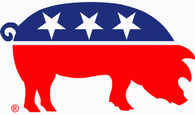
The Road From K Street to Yusufiya
By Frank Rich
AS the remains of two slaughtered American soldiers, Pfc. Thomas L. Tucker and Pfc. Kristian Menchaca, were discovered near Yusufiya, Iraq, on Tuesday, a former White House official named David Safavian was convicted in Washington on four charges of lying and obstruction of justice. The three men had something in common: all had enlisted in government service in a time of war. The similarities end there. The difference between Mr. Safavian's kind of public service and that of the soldiers says everything about the disconnect between the government that has sabotaged this war and the brave men and women who have volunteered in good faith to fight it.
Privates Tucker and Menchaca made the ultimate sacrifice. Their bodies were so mutilated that they could be identified only by DNA. Mr. Safavian, by contrast, can be readily identified by smell. His idea of wartime sacrifice overseas was to chew over government business with the Jack Abramoff gang while on a golfing junket in Scotland. But what's most indicative of Mr. Safavian's public service is not his felonies in the Abramoff-Tom DeLay axis of scandal, but his legal activities before his arrest. In his DNA you get a snapshot of the governmental philosophy that has guided the war effort both in Iraq and at home (that would be the Department of Homeland Security) and doomed it to failure.
Mr. Safavian, a former lobbyist, had a hand in federal spending, first as chief of staff of the General Services Administration and then as the White House's chief procurement officer, overseeing a kitty of some $300 billion (plus $62 billion designated for Katrina relief). He arrived to help enforce a Bush management initiative called "competitive sourcing." Simply put, this was a plan to outsource as much of government as possible by forcing federal agencies to compete with private contractors and their K Street lobbyists for huge and lucrative assignments. The initiative's objective, as the C.E.O. administration officially put it, was to deliver "high-quality services to our citizens at the lowest cost."
The result was low-quality services at high cost: the creation of a shadow government of private companies rife with both incompetence and corruption. Last week Representative Henry Waxman, the California Democrat who commissioned the first comprehensive study of Bush administration contracting, revealed that the federal procurement spending supervised for a time by Mr. Safavian had increased by $175 billion between 2000 and 2005. (Halliburton contracts alone, unsurprisingly, went up more than 600 percent.) Nearly 40 cents of every dollar in federal discretionary spending now goes to private companies.
In this favor-driven world of fat contracts awarded to the well-connected, Mr. Safavian was only an aspiring consigliere. He was not powerful enough or in government long enough to do much beyond petty reconnaissance for Mr. Abramoff and his lobbying clients. But the Bush brand of competitive sourcing, with its get-rich-quick schemes and do-little jobs for administration pals, spread like a cancer throughout the executive branch. It explains why tens of thousands of displaced victims of Katrina are still living in trailer shantytowns all these months later. It explains why New York City and Washington just lost 40 percent of their counterterrorism funds. It helps explain why American troops are more likely to be slaughtered than greeted with flowers more than three years after the American invasion of Iraq.
Read the whole thing
Frank Rich Politics Bush Cheney Haliburton Republicans Impeach Bush Terrorism Iraq War Republican Corruption